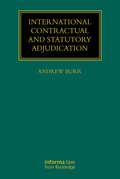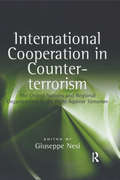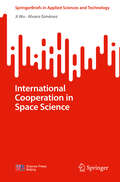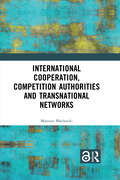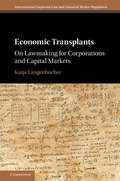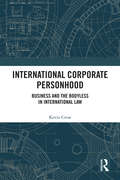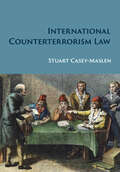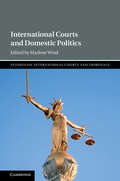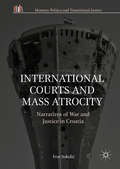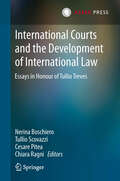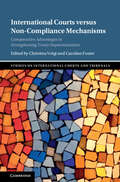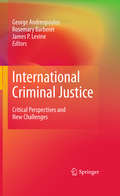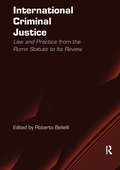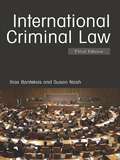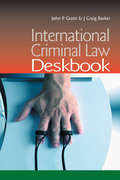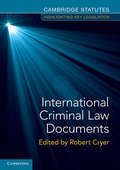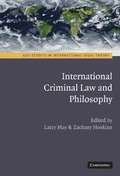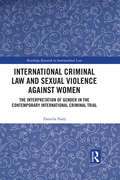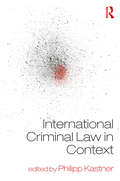- Table View
- List View
International Contractual and Statutory Adjudication (Construction Practice Series)
by Andrew Burr Kesarin JaithamA compilation of commentaries on the various jurisdictions where there either is, or is planned, a statutory adjudication system , this is a review of such systems worldwide in the commercial and construction fields. It features analysis by specialist advisory editors on the adjudication system in place in each separate jurisdiction, together with a copy of the relevant local legislation, and permits a comparative approach between each. This book addresses statutory adjudication in a way that is practically useful and academically rigorous. As such, it remains an essential reference for any lawyer, project manager,contractor or academic involved with the commercial and construction fields.
International Cooperation in Counter-terrorism: The United Nations and Regional Organizations in the Fight Against Terrorism
by Giuseppe NesiThis volume provides a timely analysis of global and regional responses to international terrorism. The work assesses the role of the United Nations and its various organs, particularly the General Assembly and the Security Council, and discusses the key legal issues. The second part of the book examines the activity of regional organizations both in their own right as well as their interaction with the UN. The volume concludes with a discussion of whether, to what extent and how the fight against terrorism has encroached upon fundamental rules of international law such as the international protection of human rights or the use of force among states. The volume is the latest in a series drawing on the presentations of high ranking scholars, diplomats and representatives of international organizations. The result is a stimulating and thought-provoking book which will be of interest to researchers and policy-makers alike.
International Cooperation in Space Science (SpringerBriefs in Applied Sciences and Technology)
by Ji Wu Alvaro GiménezThis book provides an in-depth overview of today&’s international cooperation in space science, with highlights on space science satellite programs. Unlike application satellites, data from space science satellites is open to global scientists for joint participation and analysis. Therefore, international cooperation is often involved in the proposal, selection, and implementation of space science programs. The book provides a comprehensive introduction to the importance of international cooperation in space science programs, their funding sources and stakeholders, the elements needed for successful cooperation, different forms of cooperation, legal issues to consider, and international cooperation organizations. It also presents several important examples of international cooperation and looks ahead to the future development of international cooperation. This book is aimed at scientists and engineering teams directly involved in space science satellite programs, government departments managing space science missions, and young students aspiring to a career in space science.
International Cooperation, Competition Authorities and Transnational Networks
by Mateusz BłachuckiThis book presents a comprehensive study of the emergence, functioning and evolution of international cooperation among competition authorities. It presents an in-depth look at network cooperation taking place within international organisations, as well as networks based on binding international agreements and various informal networks, among others. It further identifies and analyses the forms of international cooperation among national competition authorities (NCAs) that are taking place within transnational competition networks. The book classifies these forms of cooperation by grouping them into three stages – soft, developed and enhanced cooperation – discussing each in detail. It thus reflects the evolution of the international cooperation process and provides insights as to its possible development. This work will be of interest to researchers, academics and advanced students in the fields of competition law, public administration, international relations and those interested in international competition law and its contribution to global public governance.
International Cooperation, Competition Authorities and Transnational Networks
by Mateusz BłachuckiThis book presents a comprehensive study of the emergence, functioning and evolution of international cooperation among competition authorities. It presents an in-depth look at network cooperation taking place within international organisations, as well as networks based on binding international agreements and various informal networks, among others. It further identifies and analyses the forms of international cooperation among national competition authorities (NCAs) that are taking place within transnational competition networks. The book classifies these forms of cooperation by grouping them into three stages – soft, developed and enhanced cooperation – discussing each in detail. It thus reflects the evolution of the international cooperation process and provides insights as to its possible development. This work will be of interest to researchers, academics and advanced students in the fields of competition law, public administration, international relations and those interested in international competition law and its contribution to global public governance.
International Corporate Governance After Sarbanes-Oxley
by Greg N. Gregoriou Paul Ali"The Sabanes-Oxley Act has been one of the most significant developments in corporate and securities regulation since the New Deal. This collection of important articles would be a valuable resource for anyone seeking to understand Sabanes-Oxley's far-reaching effects on corporate governance in the United States and elsewhere."--Jesse Fried, coauthor of Pay Without Performance: The Unfulfilled Promise of Executive Compensation and Professor of Law at the University of California, Berkeley"The editors have assembled the latest cutting-edge research on international corporate governance by respected academics in this field. In this handbook, the editors deal with all aspects of the significant legislative changes to corporate governance regulation. It introduces the reader to the new rules that will certainly improve the reliability and the accuracy of disclosures made by corporations. The book comes at the right moment with the recent scandals such as Enron, which will educate all readers especially shareholders of corporate stock."--Komlan Sedzro, Professor of Finance, University of Quebec at Montreal"Today, corporate governance is a topic at the center of public policy debate in most industrialized countries. The range of concerns; the variety of approaches; and their tendency to converge in some areas or diverge in others (not always in the right directions) are emphatically demonstrated by these essays. There is material here of enormous interest for scholars of comparative law and economic regulation. And significantly, the presentation of essays from legal, financial, and regulatory viewpoints demonstrates the growing practical as well as theoretical utility of interdisciplinary work in this area. Professors Ali and Gregoriou are to be warmly congratulated for their skill and initiative in assembling an important publication, as well as for their own contributions to interdisciplinary scholarship."--R. P. Austin, BA, LLM (Sydney), DPhil (Oxon), Supreme Court of New South Wales"This very international collection emphasizes the economic line of descent, while including legal and socio-legal contributions. It fills a very important gap in our empirical knowledge of corporate governance. It is accessible and comprehensive and will greatly assist readers from all relevant disciplines, who are trying to discern the shape of corporate governance as a mature field."--Dimity Kingsford Smith, Professor of Law, University of New South Wales
International Corporate Governance: A Comparative Approach
by Thomas ClarkeComprehensive and up-to-date, this important textbook analyzes the escalating crisis in corporate governance and the growing interest in its reform across the globe. Written by a leading name in the field of corporate governance from a genuinely international perspective, this excellent textbook provides a balanced analysis of the relative strengths and weaknesses of the Anglo-Saxon, European and Asian traditions of corporate governance; offering a prognosis of the future development, complexity and diversity of corporate governance forms and systems. It: investigates the reasons for the failure of Enron, WorldCom, Tyco, Parmalat and other major international corporations examines the role of international standards of corporate governance, with the intervention of the OECD, World Bank and IMF explores the continuing cultural diversity in corporate and institutional forms in the United States and UK, Europe and Asia Pacific. Illustrated with a wealth of up-to-the minute case studies and packed full of excellent illustrative material that guides student readers through this complex subject, International Corporate Governance is a must read for anyone studying corporate governance today.
International Corporate Governance: A Comparative Approach
by Thomas ClarkeThomas Clarke’s International Corporate Governance offers a panoramic guide to corporate governance and examines the recurring crises in governance and the reform around the world. This is a popular classic book but significant changes have been made to this new edition to take account of: the continuing impact of the global financial crisis and the wave of regulation development flowing from this the profound consequences of climate change and the urgent need for corporations to respond with the commitment to sustainable value creation Important elements of the work include: contemporary governance failures including BP, VW, Boeing, GM/Tesla, Apple, Purdue Pharma, and Theranos; the ongoing vitality of the diversity of corporate governance across the world; digital disruption in capital markets and initiatives to build long-term investment; the universal impact of financialization and resulting increasing inequality; the essential logic of corporate governance and corporate sustainability. The textbook contains a wealth of pedagogical material to guide the reader through this complex subject, with student questions to help with assessments and new companion website. There are 14 new forensic case analyses critically scrutinizing governance failures. International Corporate Governance is an essential text for those studying corporate governance at the advanced undergraduate, postgraduate, or executive level.
International Corporate Law and Financial Market Regulation: On Lawmaking for Corporations and Capital Markets (International Corporate Law and Financial Market Regulation)
by Katja LangenbucherWhy and in what ways have lawyers been importing economic theories into a legal environment, and how has this shaped scholarly research, judicial and legislative work? Since the financial crisis, corporate or capital markets law has been the focus of attention by academia and media. Formal modelling has been used to describe how capital markets work and, later, been criticised for its abstract assumptions. Empirical legal studies and regulatory impact assessments offered different ways forward. This book presents a new approach to the risks and benefits of interdisciplinary policy work. The benefits economic theory brings for reliable and tested lawmaking are contrasted with important challenges including the significant differences of research methodology, leading to misunderstandings and problems of efficient implementation of economic theory's findings into the legal world. Katja Langenbucher's innovative research scrutinises the potential of economic theory to European legislators faced with a lack of democratic accountability.
International Corporate Personhood: Business and the Bodyless in International Law
by Kevin CrowThis book tracks the phenomenon of international corporate personhood (ICP) in international law and explores many legal issues raised in its wake. It sketches a theory of the ICP and encourages engagement with its amorphous legal nature through reimagination of international law beyond the State, in service to humanity. The book offers two primary contributions, one descriptive and one normative. The descriptive section of the book sketches a history of the emergence of the ICP and discusses existing analogical approaches to theorizing the corporation in international law. It then turns to an analysis of the primary judicial decisions and international legal instruments that animate internationally a concept that began in U.S. domestic law. The descriptive section concludes with a list of twenty-two judge-made and text-made rights and privileges presently available to the ICP that are not available to other international legal personalities; these are later categorized into ‘active’ and ‘passive’ rights. The normative section of the book begins the shift from what is to what ought to be by sketching a theory of the ICP that – unlike existing attempts to place the corporation in international legal theory – does not rely on analogical reasoning. Rather, it adopts the Jessupian emphasis on ‘human problems’ and encourages pragmatic, solution-oriented legal analysis and interpretation, especially in arbitral tribunals and international courts where legal reasoning is frequently borrowed from domestic law and international treaty regimes. It suggests that ICPs should have ‘passive’ or procedural rights that cater to problems that can be characterized as ‘universal’ but that international law should avoid universalizing ‘active’ or substantive rights which ICPs can shape through agency. The book concludes by identifying new trajectories in law relevant to the future and evolution of the ICP. This book will be most useful to students and practitioners of international law but provides riveting material for anyone interested in understanding the phenomenon of international corporate personhood or the international law surrounding corporations more generally.
International Counterterrorism Law
by Stuart Casey-MaslenInternational Counterterrorism Law is the first book to consider national terrorism legislation in every one of the 197 States worldwide. It explains how international counterterrorism law has become a distinct branch of international law, and what the different components are in both peacetime and armed conflict. The relevance and contribution of international humanitarian law, international criminal law, national criminal law, and international human rights law are examined in combination with global sectoral terrorism treaties and regional instruments to provide a thorough yet manageable account of the law's application. Real-life examples are used to inform the material, from Ukraine to Syria, to Iran and the unlawful actions of the Global War on Terror, so that the reader can understand how domestic and international terrorism has historically been treated by prosecutors and the courts.
International Courts and Domestic Politics (Studies on International Courts and Tribunals)
by Marlene WindInternational law in national courts, and among politicians and citizens, does not always have the desired effect at the domestic level. This volume is a genuinely interdisciplinary analysis of international law and courts, examining a wide range of courts and judicial bodies, including human rights treaty bodies, and their impact and shortcomings. By employing social science methodology combined with classical case studies, leading lawyers and political scientists move the study of courts within international law to an entirely new level. The essays question the view that legal docmatics will be enough to understand the increasingly complex world we are living in and demonstrate the potential benefits of adopting a much broader outlook drawing on empirical legal research. This volume will have great appeal to anyone interested in the effects - rather than just the processes and structures - of international law and courts.
International Courts and Mass Atrocity: Narratives of War and Justice in Croatia (Memory Politics and Transitional Justice)
by Ivor SokolićThe extra-legal effects of international and domestic war crimes trials continue to puzzle researchers and practitioners. In the former Yugoslav states, the legacy of conflict and issues of transitional justice remains central in politics, society and culture. This book provides a new theoretical and methodological approach to one of these puzzles: why universal human rights norms become distorted or undermined when they reach local publics. It investigates the social and cultural contexts that transitional justice processes take place in by looking at how emotional everyday narratives can hamper the spread of norms in society. In Croatia, these narratives define how the public understands the rule of law, history and minority rights.
International Courts and the Development of International Law
by Tullio Scovazzi Nerina Boschiero Cesare Pitea Chiara RagniThis book contains a collection of essays by leading experts linked to the outstanding characteristics of the scholar in honour of whom it is published, Tullio Treves, who combines his academic background with his practical experiences of a negotiator of international treaties and a judge of an international tribunal. It covers international public and private law related to international courts and the development of international law. Under Article 38 of its Statute, the International Court of Justice can apply judicial decisions only as a "subsidiary means for the determination of rules of law". However, there are many reasons to believe that international courts and tribunals do play quite an important role in the progressive development of international law. There are a number of decisions which are inevitably recalled as the first step, or a decisive step, in the process of the formation of a new rule of customary international law. In these cases, can the judge be considered as a subsidiary of others? Are these cases compatible with the common belief that a judge cannot create law? Is this a peculiarity of international law, which is characterized by the existence of several courts but the lack of a legislator? Do decisions by different courts lead to the consequence of a fragmented international law? This volume provides the reader with an elaboration of various questions linked to the legislative role of courts. In their choices of subjects, some contributors have taken into account the general aspects of the development of international rules through court decisions or specific sectors of international law, such as human rights, international crimes, international economic law, environmental law and the law of the sea. Others have chosen the subject of the rules on jurisdiction and procedure of international courts. The question of the courts' role in the development of areas of law different from public international law, namely private international law and European Union law, has also been considered. The information and views contained in this book will be of great value to academics, students, judges, practitioners and all others interested in the public and private international law aspects of the link between international courts and the development of international law.
International Courts and the Performance of International Agreements
by Matthew J. Gabel Clifford J. CarrubbaNations often turn to international courts to help with overcoming collective-action problems associated with international relations. However, these courts generally cannot enforce their rulings, which begs the question: how effective are international courts? This book proposes a general theory of international courts that assumes a court has no direct power over national governments. Member states are free to ignore both the international agreement and the rulings by the court created to enforce that agreement. The theory demonstrates that such a court can, in fact, facilitate cooperation with international law, but only within important political constraints. The authors examine the theoretical argument in the context of the European Union. Using an original data set of rulings by the European Court of Justice, they find that the disposition of court rulings and government compliance with those rulings comport with the theory's predictions.
International Courts versus Non-Compliance Mechanisms: Comparative Advantages in Strengthening Treaty Implementation (Studies on International Courts and Tribunals)
by Christina Voigt Caroline FosterThis book explores the best mechanisms for helping bring about compliance with international treaties. In recent years, many international treaties have included non-compliance mechanisms (NCMs) to facilitate implementation and promote parties' compliance with their obligations. These NCMs exist alongside the formal dispute resolution processes of international courts and tribunals. The authors bring together a wide legal and geographical spectrum of views from different parts of the world representing novel insights into NCMs' contribution to treaty implementation and compliance. The research has cast important light on how procedural innovations may help render NCMs more effective, as well as on the circumstances in which they may be needed, including particularly where nations share common interests, populations are interdependent, and implementation makes significant administrative, regulatory and political demands. This title is also available as Open Access on Cambridge Core.
International Crime and Justice
by Mangai NatarajanInternational crime and justice is an emerging field that covers international and transnational crimes that have not been the focus of mainstream criminology or criminal justice. This book examines the field from a global perspective. It provides an introduction to the nature of international and transnational crimes and the theoretical perspectives that assist in understanding the relationship between social change and the waxing and waning of the crime opportunities resulting from globalization, migration, and culture conflicts. Written by a team of world experts, it examines the central role of victim rights in the development of legal frameworks for the prevention and control of transnational and international crimes. It also discusses the challenges to delivering justice and obtaining international cooperation in efforts to deter, detect, and respond to these crimes. This book is arranged in nine parts covering the subject matter of international criminal justice. Each of the short chapters provides readers with an understanding of the main concepts relevant to the topic and sensitizes them to the complex nature of the problems.
International Criminal Justice
by Rosemary Barberet James P. Levine George AndreopoulosIn recent years, justice-related and human rights issues have figured more and more prominently on the international political agenda. This expansion of the justice space is a product of a growing demand for accountability in world politics. Whether the issue is addressing heinous crimes such as genocide, war crimes and crimes against humanity in situations of armed conflict, confronting the inability or reluctance of governments to protect their own populations, or responding to the challenges posed by transnational terrorism; the international community has witnessed the proliferation of institutions and mechanisms, as well as the dynamic interplay between domestic and international processes, in the pursuit of justice-sensitive outcomes. International and hybrid tribunals, UN-led and domestic counter-terrorist initiatives, and the use of force for human protection purposes have demarcated the space within which ethical, political, and legal debates have unfolded in the quest for a more humane world order. The contributors of International Criminal Justice: Theoretical and Legal Perspectives address some of the most important issues and debates involved in this quest, and assess the merits of contending approaches to the promotion of international justice norms. This volume will contribute to the ongoing debate on the challenges, as well as opportunities, facing the justice agenda in its effort to shape developments in an increasingly interdependent world.
International Criminal Justice: Law and Practice from the Rome Statute to Its Review
by Roberto BellelliThis volume presents an overview of the principal features of the legacy of International Tribunals and an assessment of their impact on the International Criminal Court and on the review process of the Rome Statute. It illustrates the foundation of a system of international criminal law and justice through the case-law and practices of the UN ad hoc tribunals and other internationally assisted tribunals and courts. These examples provide advice for possible future developments in international criminal procedure and law, with particular reference to their impact on the ICC and on national jurisdictions. The review process of the Rome Statute is approached as a step of a review process to provide a perspective of the developments in the field since the Statute’s adoption in 1998.
International Criminal Law
by Ilias Bantekas Susan NashProviding an introduction to, and detailed examination of substantive, enforcement and procedural aspects of international criminal law, this book’s examination of international and transnational crimes under treaty and customary law has been fully updated and revised. Exploring the enforcement of international criminal law through an investigation of the practice of the Security Council-based tribunals for Yugoslavia and Rwanda, the International Criminal Court and other hybrid tribunals, such as those for Cambodia, Sierra Leone, Lockerbie and truth commissions, the authors look at terrorism, offences against the person, piracy and jurisdiction, and immunities amongst a variety of other topics. New to this edition are four additional chapters on: various forms of liability and participation in international crime war crimes crimes against humanity genocide and illegal rendition. This is an ideal text for undergraduate and postgraduate students of law or international relations, practitioners and those interested in gaining an insight into international criminal law
International Criminal Law Deskbook
by John Grant Craig BarkerAttempts to try individuals such as Slobodan Milosevic and Saddam Hussein for international crimes and the creation of the International Criminal Court highlight the growing currency and importance of international criminal law as a discipline in its own right. Contemporary importance and academic interest in the subject is rapidly eclipsing that in the more mainstream discipline of human rights. For practitioners, scholars and students of international criminal law (ICL), this unique collection provides access to the core international instruments in one convenient volume. Containing seventy-nine principal documents on ICL dating from 1919 to 2005, this user-friendly book organizes the documents around generally recognised categories of international crimes, such as war crimes, crimes against humanity and terrorism. It also includes constitutive instruments of the most important international, domestic and hybrid tribunals, including the Statute of the International Criminal Court, its rules of procedure and elements of crimes. Principal international and regional instruments which deal with the facilitation of a truly international system of criminal justice, in the form of extradition and mutual assistance are also included. Each document has been carefully edited to present information that is directly relevant to international criminal law while all extraneous material has been excluded. Most importantly, each extract has its own introduction which provides the reader with official citations, parties, date of entry into force, an outline of the legislative history, links to related documents and a brief commentary analyzing and contextualizing the principal provisions.
International Criminal Law Documents
by Robert CryerThis carefully edited text collects the major documents on International Criminal Law, through the early practice after the First World War, the Nuremberg and Tokyo International Military Tribunals up to the present. It includes the statutes of the ad hoc Tribunals for the former Yugoslavia and Rwanda, as well as the Rome Statute of the International Criminal Court and its associated documents, including the elements of crimes that were adopted to assist the Court, and its Rules of Procedure and Evidence. The book also includes the main treaty provisions that provide the basis of the subject. Edited by a specialist in the field with more than twenty years' experience of teaching international criminal law, this book is designed for practical use by students and practitioners. For students it is ideal as a companion for both study and examination.
International Criminal Law and Philosophy
by Larry May Zachary HoskinsInternational Criminal Law and Philosophy is the first anthology to bring together legal and philosophical theorists to examine the normative and conceptual foundations of international criminal law. In particular, through these essays the international group of authors addresses questions of state sovereignty; of groups, rather than individuals, as perpetrators and victims of international crimes; of international criminal law and the promotion of human rights and social justice; and of what comes after international criminal prosecutions, namely, punishment and reconciliation. International criminal law is still an emerging field, and as it continues to develop, the elucidation of clear, consistent theoretical groundings for its practices will be crucial. The questions raised and issues addressed by the essays in this volume will aid in this important endeavor.
International Criminal Law and Sexual Violence against Women: The Interpretation of Gender in the Contemporary International Criminal Trial (Routledge Research in International Law)
by Daniela NadjThis book explores the prosecution of wartime sexual violence in international criminal law and asks what the juridicalisation of gender-based violence signifies for women. The book explores the portrayal of the various gendered identities that surface in armed conflict and it asks whether the law is capable of reflecting these in subsequent judgements. Focusing on the International Criminal Tribunal for the Former Yugoslavia and the International Criminal Tribunal for Rwanda as well as subsequent developments in the International Criminal Court, the book shows how the tribunals have delivered landmark jurisprudence in the area of sexual violence against women and provided a legacy for how gender justice is incorporated into international law. However, Daniela Nadj argues that in the relevant cases there is a tendency to depict women in monolithic fashion with little agency or sense of identity beyond their ethnicity. By bringing to the surface the complexity and multi-faceted gendered identities in wartime, the book calls for a reconceptualisation of notions of femininity in armed conflict.
International Criminal Law in Context
by Philipp KastnerInternational Criminal Law in Context provides a critical and contextual introduction to the fundamentals of international criminal law. It goes beyond a doctrinal analysis focused on the practice of international tribunals to draw on a variety of perspectives, capturing the complex processes of internationalisation that criminal law has experienced over the past few decades. The book considers international criminal law in context and seeks to account for the political and cultural factors that have influenced – and that continue to influence – this still-emerging body of law. Considering the substance, procedures, objectives, justifications and impacts of international criminal law, it addresses such topics as: • the history of international criminal law; • the subjects of international criminal law; • transitional justice and international criminal justice; • genocide, crimes against humanity, war crimes and the crime of aggression; • sexual and gender-based crimes; • international and hybrid criminal tribunals; • sentencing under international criminal law; and • the role of victims in international criminal procedure. The book will appeal to those who want to study international criminal law in a critical and contextualised way. Presenting original research, it will also be of interest to scholars and practitioners already familiar with the main legal and policy issues relating to this body of law.
